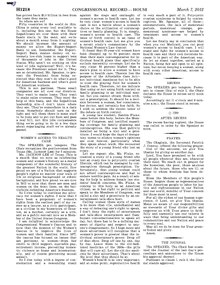Women's Access to Health Care

Women's Access to Health Care
HON. SHEILA JACKSON LEE
OF TEXAS
IN THE HOUSE OF REPRESENTATIVES
Wednesday, March 7, 2012
WOMEN'S ACCESS TO HEALTH CARE
The SPEAKER pro tempore. The Chair recognizes the gentlewoman from
Texas (Ms. Jackson Lee) for 5 minutes.
Ms. JACKSON LEE of Texas. This is a month that we note as celebrating women and women's history as a major component of the wonderful history of the greatest Nation in the world. How proud we are of a Nation that supports people's rights no matter your walk of life or religious background or ethnic background; and how proud we are now in 2012 to note that there are men and women on the front lines, on the battlefields defending America's freedom.
So I rise today to continue my advocacy for women's rights. I note that I have been a proponent of women's rights from the earliest part of my career as a lawyer, as a civic participant, as a civilian in my hometown of Houston, as a mother, certainly as a wife, and as a public servant now as a Member of the United States Congress.
I am delighted to acknowledge the Congressional Women's Caucus and to note that the mission of the Women's Caucus is to improve the lives of women and their families. Since 1977, the caucus has focused on issues that are pertinent to women--from fair credit to child support, equitable pay, retirement income, preventing domestic violence at home and internationally, and of course preventing sexual assault.
So I rise today with a degree of consternation and a resounding stand against the siege and onslaught of women's access to health care. Let me be very clear: women's access to health care is not a battle about a woman's choice or the utilization of contraceptives or family planning. It is, simply, women's access to health care. The issue of birth control is an issue of women's health care. Let me give you a recent study's commentary by the National Women's Law Center:
It found that 25-year-old women have been charged up to 84 percent more than their male contemporaries for individual health plans that specifically exclude maternity coverage. Let me be very clear: 84 percent higher than a male's plan to allow a woman to have access to health care. Therein lies the purpose of the Affordable Care Act--not individual mandates but to be able to even the playing field for women's health care. Therefore, let me indicate that using or not using birth control or family planning is an individual matter, but you cannot obtain those without a prescription. It should be a decision between a woman, her conscience, her doctor, and certainly her faith. So I wish to address the recent tenor of the debate on birth control.
A young law student, Sandra Fluke, came before this body, before the Members of Congress, and testified regarding coverage for family planning and contraceptives. She was then publicly derailed as being a slut and a prostitute. I would hope the days of derogatory terms to silence women's opinions are over forever, particularly when they speak about truth. She recounted the story of a young friend who lost an ovary.
Let me repeat: she, Ms. Fluke, recounted a story of a young friend who lost an ovary due to polycystic ovarian fibroids, which can be managed by contraceptives through prescription. Unfortunately, that young woman could not afford contraceptives and had to endure terrible pain. As a result of asking for help to address female law students' health concerns, Ms. Fluke, in coming to this body as an American citizen, as is her right to petition and speak to the Members of Congress, was called a slut and a prostitute by an entertainment talk- show host.
Calling women these sorts of names is no more than vile, underhanded and a way of defeating one's right to speak. I don't deny the right of entertainers and talk-show entertainers and flamboyant conversationalists to speak all day, but there has to be a defining moment of dignity and respect to anyone's disagreement. So I hope more and more advertisers will recognize that a woman's power is greater than the individual entertainer's power. Drop off of that show. Drop off one by one, day by day. Leave them to the old-fashioned medicine of the 1800s--the pills that will cure all. Let the old doc medicine be their advertisers. That's about the level that they should be at.
Women's health is so very important; and at some point, reproductive health is very much a part of it. Polycystic ovarian syndrome is helped by contraceptives. Mr. Speaker, all of these--endometriosis, the lack of menstrual periods, menstrual cramps, premenstrual syndrome--are helped by treatment and access to women's health.
Let me finally say in conclusion that when you cut Medicaid, you cut poor women's access to health care. I will stand and fight for women's access to health care and their own decisions because it is part of the American way. So let us stand together, united as a Nation, being fair and open to all opinions, but never denying a woman, along with every other American, access to health care.
____________________
![]()
This work is in the public domain in the United States because it is a work of the United States federal government (see 17 U.S.C. 105).
![]()
Public domainPublic domainfalsefalse
